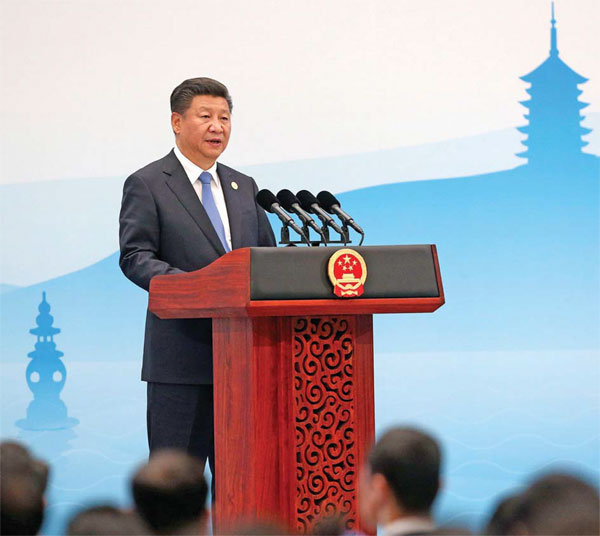
President Xi Jinping addresses the media on Sept 5 after the G20 Summit in Hangzhou, Zhejiang province. (Feng Yongbin / China Daily)
In response to global economic growth that had been "too low for too long for too few", as International Monetary Fund Managing Director Christine Lagarde described, the G20 wrapped up the Hangzhou Summit on Sept 5 with a resounding call to revitalize globalization.[Special coverage]
In a way, the "Hangzhou Consensus", which is aimed at facilitating global economic growth in a more comprehensive, innovative and inclusive manner, can serve as a "new starting point" for both China and global governance. To make that possible, global leaders should bear those principles in mind while addressing problems at home, and heed lessons from the previous attempts to fix the international economic order.
The Washington Consensus, coined by U.S. economist John Williamson in 1989, proclaims the solution to the problems faced by the less-developed economies in Latin America and post-Cold War Eastern Europe is "neo-liberalism" which stresses the primacy of markets and limits the role of the state.
Featuring fiscal discipline, cuts in public subsidies, trade liberalization, and "shock therapy", the consensus, instead of solving problems, led to severer polarization of the rich and poor in the countries that adopted its prescriptions. Its failure prompted Goldman Sachs' Joshua Cooper Ramo to consider a "Beijing Consensus" as an alternative path to development in 2004. His proposal was based on China's unprecedented economic success after it launched reform and opening-up in the late 1970s.
The Beijing Consensus, as Ramo argued, consisted of a commitment to innovation and constant experimentation, focus on sustainability and equality, and resolute defense of national sovereignty and interests. Seen by many as a challenge to the Washington Consensus, the Beijing Consensus, to some extent, outlined what the Hangzhou Consensus has offered.
In Hangzhou, leaders from the world's 20 largest economies agreed to enhance policy coordination and innovation-led growth, and improve global economic governance to reinvigorate cross-border trade and investment. The focus on "innovation", a term cited in the G20 communiqué repeatedly, is solid proof that Chinese leaders have been consistent in pursuing innovation-driven growth.
Besides, internet-based innovations are expected to play a major role in future economic recovery, especially when the last round of industrial and technological revolution is losing momentum and new alternatives are still in the making. This is exactly what the Hangzhou Consensus has underlined.
Inclusiveness and openness, too, are needed to help innovation live up to its potential and use the international order to the optimum extent. China's rise to be the world's second-largest economy is an apt example of how much difference the reform and opening-up policy has made. So China will keep providing quality public goods to the international community, rather than building trade barriers like some Western politicians have proposed to do in recent days.
On the other hand, the fact that 57 countries have joined the Beijing-led Asian Infrastructure Investment Bank, and that many of them may be interested in the Belt and Road Initiative, is further evidence of China's fruitful endorsement of inclusive global governance. And the implementation of the Hangzhou Consensus will surely add new impetus to the world economy.
By Wang Peng
The author is an associate researcher at the China Institute, Fudan University.


















































